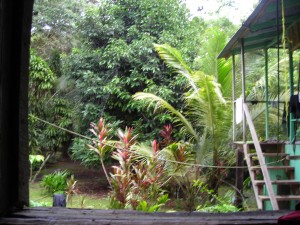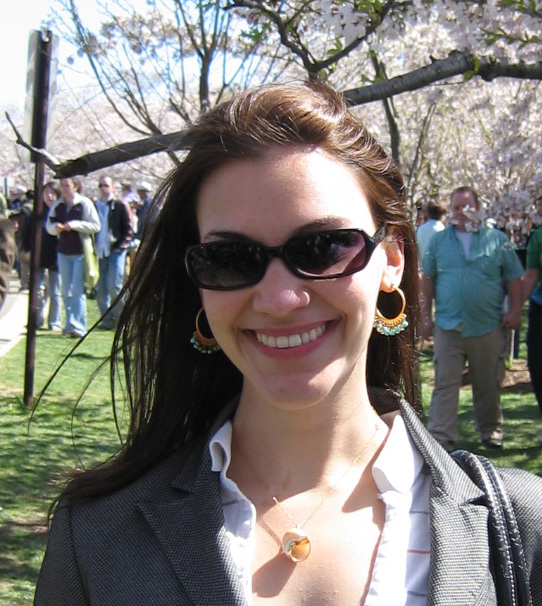
I volunteered abroad twice when I was younger; both times, I spent a week in the slums of a very impoverished Mexican border town and helped build homes for families without adequate shelter. I went with a friend’s church group; I’m not Christian, but I liked the idea of what they were doing, so I signed up. While the devotionals in the morning and the sermons at night made me feel out of place, the work I did during the day in those two weeks were some of the most life-changing experiences I have ever had. I have been more interested in global volunteering as an adult, but I didn’t want to go with a religious group again and I wasn’t really sure where to start.
I decided to interview Sarah Van Auken, the creator of Volunteering Global. She is a graduate of the George Washington University, and has four years’ work experience with the Peace Corps. Currently, she lives in Washington, D.C., where she enjoys playing saxophone, going to the gym, and volunteering locally.
Maiden Voyage: What is Volunteering Global and why did you decide to start it?
Sarah Van Auken: Volunteering Global is a website that educates and connects people interested in international volunteering and general travel. The main components of the site are the member-generated forums and blogs, as well as individual pages dedicated to hundreds of volunteer programs worldwide.
I started Volunteering Global in 2005 as a sort of catchall for the international service programs I researched for my own benefit. At my parents’ encouragement, I compiled these programs and some basic information about them, like where they worked and how much they cost, for other people who might be interested in volunteering abroad. It’s a very fun project! I recently unveiled a new design, which has gotten lots of positive feedback.
MV: Why should people consider volunteering abroad? What are the benefits?
SV: I think there are many benefits to volunteering abroad – there’s the fact that you’re helping an underserved community, you’re experiencing a new culture (even immersing yourself into a homestay in many cases), and you’re learning something new, whether it’s about the host community, the country, the language, the food, or even the religion in the area. Participants actively seek out these programs and aren’t confined in the types of work they’d like to do – there’s something for people of any background and age.
MV: Is volunteering abroad safe?
Overall, I will say yes, but as long as the person uses common sense. From what I’ve researched, the biggest threat is that of pickpockets – but this is avoidable if you pack light, keep an eye on your belongings, and don’t draw attention to yourself (like wearing jewelry or holding your camera out while looking bewildered).
Otherwise, just research the area. Trust your gut: If there have been travel advisories for that particular country, consider going elsewhere. Check with your doctor about immunizations, and try to learn a little about the customs so you don’t inadvertently offend your host community. If a worst-case scenario happens, most volunteer programs have an evacuation plan and/or transportation to a hospital if needed.

MV: What criteria should people look for when selecting a service opportunity? How do they know what the best program for them is?
The criteria I find most people tend to look for first are location, type of work, cost, and length of the trip. That usually narrows it down to a few groups to research and consider further.
Also, try not to romanticize volunteering, as it’s hard work, and you’re there because the community doesn’t have the resources to help itself. Of course you’ll have fun, but before you go, think hard about your priorities, and the priorities of the host organization. You’ve probably heard of “volunteer vacations” – with yourself and the host group in mind, figure out whether you’re both on the same page about emphasizing “volunteer” or “vacation,” or whether they’re balanced. Once you find a group that matches your mindset, it makes the trip that much more fulfilling.
MV: What does it usually cost to volunteer abroad – does it have to be expensive?
Costs vary greatly depending on host organization. The groups I tend to list on my site are on the less expensive side, as I tend to promote the “little guys” over the larger groups that pop up first in search engines. This isn’t to single out or disparage any particular organization, though! It’s just my personal preference to find smaller, local organizations that take volunteers.
So let’s say you’re looking at my website. There currently are about 340 groups listed on there, and I’d say the average cost to volunteer, without the plane ticket, is about $120 per week, and that’s mostly to cover housing and food. There definitely are some outliers on the site, with a few of them being upwards of $1,000 per week, with others costing only $15 per week. And it’s very possible to find programs for free as well – in fact, the longer you stay with a group, the more likely it is that your fee will be waived in lieu of your work.
Finally, if you type “international volunteering” or “volunteer vacation” into a search engine, I’d say the programs you’ll find usually average about $800 to $1,500 per week. So it really depends on where you’re looking, but nope, it doesn’t have to be expensive at all! Just keep digging till you find what you’re looking for, because I guarantee it’s there.
MV: How can people avoid scams?
Oh, this one is interesting! For the longest time, people told me that the more expensive groups look like scams because some of them can just get so costly. However, a few weeks ago I was talking to a friend who mentioned being a little wary of the less expensive organizations when she was researching volunteer opportunities. What kind of safety can they give if they have a terribly designed website and only charge $100 per week, as opposed to a big group charging $1,500 per week, and boasting a flashy, interactive website?
In the end, she went with the less expensive option, and had a wonderful time. When I asked what made her choose that group, she said it was because she got in touch with the organization itself. The director emailed her immediately and answered all of her questions, and provided background information and a volunteer packet for her trip. That’s the best advice I can give – when in doubt, contact the group!
Some more tips for avoiding scams:
• Read reviews – you usually can find these by typing the name of your host group, plus “review” into a search engine.
• See where their funding is coming from, and where your donation goes. Most reputable groups list this online already. If you find one you like and it doesn’t list the breakdown, don’t write it off immediately – if you contact the coordinators, they should be happy to let you know.
• Try to find alumni through Facebook or Twitter. In my research, this has been one of the best ways to learn quickly about the volunteer experience. Almost every organization out there has a Facebook group or fan page, and if you send out messages asking the Twitterverse if anyone’s volunteered with a particular group, you’ll likely get at least one response.
• And finally, a goofy metaphor: If it looks like a duck, quacks like a duck, and waddles like a duck, then it’s probably a duck. Just trust your gut – if you think it’s a scam, avoid it. Sometimes it might not be, but if you leave it alone just in case, then there’s no harm done.



